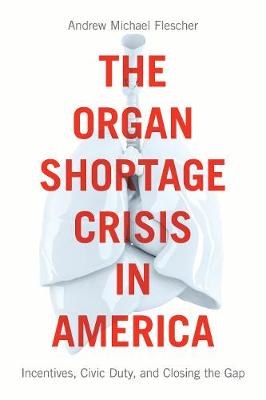(To see other currencies, click on price)
MORE ABOUT THIS BOOK
Main description:
Nearly 120,000 people are in need of healthy organs in the United States. Every ten minutes a new name is added to the list, while on average twenty people die each day waiting for an organ to become available. Worse, our traditional reliance on cadaveric organ donation is becoming increasingly insufficient, and in recent years there has been a decline in the number of living donors as well as in the percentage of living donors relative to overall kidney donors. Some transplant surgeons and policy advocates have responded to this shortage by arguing for the legalization of the sale of organs among living donors. Andrew Flescher objects to this approach by going beyond concerns traditionally cited about social justice, commodification, and patient safety, and moving squarely onto the terrain of discussing what motivates major and costly acts of human selflessness.
What is the most efficacious means of attracting prospective living kidney donors? Flescher, drawing on literature in the fields of moral psychology and economics, as well as on scores of interviews with living donors, suggests that inculcating a sense of altruism and civic duty is a more effective means of increasing donor participation than the resort to financial incentives. He encourages individuals to spend time with patients on dialysis in order to become acquainted with their plight and, as an alternative to lump-sum payments, consider innovative solutions that positively impact living donor participation that do not undermine the spirit of the National Organ Transplant Act of 1984. This book not only re-examines the important debate over whether to allow the sale of organs; it is also the first volume in the field to take a close look at alternative solutions to the organ shortage crisis.
Contents:
Acknowledgments
Introduction: The Organ Shortage Crisis in America Motivations for Giving, Especially of Precious GoodsCivic Duty A Word about the Audience and Purpose of This Book Organization Notes
1. The Case for Legalizing the Sale of Organs The Market as a Solution, If Not a Virtue Costs and Equity The "Tyranny of the Gift" Financial Incentives, Libertarianism, and the Black Market The Unique Case of Iran A Legal, Regulated Market for Organ Trade Notes
2. Ethical Concerns with Legalizing the Sale of Organs The Utility of Utility Selling Organs and the Impoverished Selling Organs and Public Safety Commodification Moving from Ethical to Pragmatic Considerations Notes
3. Organ Donation, Financial Motivation, and Civic Duty Paying It Forward Wolfenschiessen, Switzerland How Buying a Good Changes a GoodThe Difference between Lump-Sum Incentives and Compensatory MeasuresCivic Duty Notes
4. Living Donors and the Confluence of Altruism and Self-Regard Complex Human Motivations and the Myth of Unmotivated Altruism Living Donors and Living Donor Advocacy The Health Benefits of Living Donation Reflections of a Living Donor Advocate Notes
5. Making Altruism Practical Reducing Disincentives and Opening Doors to Virtue Paired Exchanges and Donor Chains Creating Incentives to Opt In Lost Wages and Travel Expenses Publicly Acknowledging Living Donors Nonmonetary Valuable, Comparable GoodsHelping Virtue Along Notes
Conclusion: Two to Four Hours of Your Life Notes
Index
About the Author
PRODUCT DETAILS
Publisher: Georgetown University Press
Publication date: March, 2018
Pages: 188
Weight: 454g
Availability: Available
Subcategories: Ethics, General Practice

